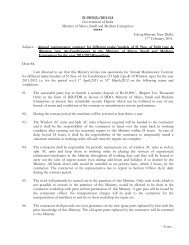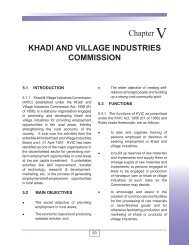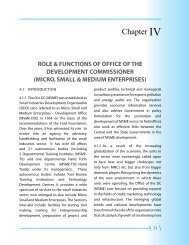Evaluation Study MSE Cluster Development - Ministry of Micro ...
Evaluation Study MSE Cluster Development - Ministry of Micro ...
Evaluation Study MSE Cluster Development - Ministry of Micro ...
Create successful ePaper yourself
Turn your PDF publications into a flip-book with our unique Google optimized e-Paper software.
Chapter No: 3 – The <strong>Cluster</strong> <strong>Development</strong> Executive/AgentIt is seen that awareness regarding the job responsibilities are quite high in the case <strong>of</strong> 8<strong>of</strong> the 12 specific functions related to s<strong>of</strong>t interventions while it is fairly low in the case <strong>of</strong>4 <strong>of</strong> the 12 specific functions. Awareness regarding the role and responsibilities relatedto the development <strong>of</strong> an information bank and portal, the development <strong>of</strong> new productbrochures and information CDs, the development <strong>of</strong> new products and market andinstitutional tie-ups, and the creation <strong>of</strong> raw material banks and spares through collectiveprocurement are areas where the CDEs have a very low awareness as reflected in theirresponses. Moreover the confidence levels for shouldering these responsibilitieseffectively are found to be uniformly low among the CDEs. This reflects the deficienciesin the proper grounding and training required to effectively carry out these functions.Most s<strong>of</strong>t interventions require the CDEs to have the required expertise in thebehavioural, organizational and managerial skills and it is not surprising to observe suchlow levels <strong>of</strong> confidence considering the educational and experiential background <strong>of</strong> theCDEs as seen in our earlier section.The functions and responsibilities pertaining to hard interventions also require additionalhard skills such as project formulation and monitoring. Here even the awarenessregarding functional responsibilities are very low leave alone the level <strong>of</strong> confidence toeffectively carry out the tasks involved.3.6 Tenure and Stage <strong>of</strong> Deployment <strong>of</strong> CDEAs seen in the earlier chapter the <strong>Cluster</strong> <strong>Development</strong> Programme passes through 5distinct stages, the first stage involves the conduct <strong>of</strong> a diagnostic study and theidentification and selection <strong>of</strong> the cluster for subsequent interventions, the last stage inthe setting up <strong>of</strong> the Common Facilities Centre and the commissioning <strong>of</strong> the CFC. TheCDEs should be assigned or deployed in a cluster from the very first stage, and shouldcontinue to catalyze and assist in the completion <strong>of</strong> all the stages over the time cycle <strong>of</strong>the programme in each selected cluster.Ideally speaking, the CDE should be assigned to or deployed in a cluster from the veryfirst stage and must continue to carry out his functions till the last stage is successfullycompleted. This enables him to thoroughly familiarize himself with his cluster, gain theconfidence <strong>of</strong> individual cluster actors, develop the necessary network with other clusterpartners and stakeholders such as BDS providers, technical consultants, and regulatingand monitoring agencies. It is therefore essential that his tenure as the CDE in a specificcluster conform to the expected programme cycle for that cluster. This continuous anduninterrupted deployment makes him accountable to the stakeholders and programmemanagers.It is also observed that CDEs are constantly and frequently transferred from one clusterto another not allowing them the time to gain the confidence <strong>of</strong> cluster actors andstakeholders, and not giving him the required stability <strong>of</strong> tenure to thoroughly familiarizehimself with any specific cluster. He would, like the proverbial ‘rolling stone’ gather nomoss. However this does not mean that the CDE should be permanently deployed in acluster and not assessed for his performance <strong>of</strong> successfully completing the stages withindefined segments <strong>of</strong> the programme cycle. We have seen in the last chapter that thereare many sampled clusters that have lingered on in the 1st stage for many years and69
















